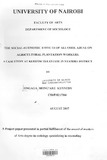| dc.contributor.author | Ongaga, Mong'are K | |
| dc.date.accessioned | 2013-05-06T08:33:06Z | |
| dc.date.available | 2013-05-06T08:33:06Z | |
| dc.date.issued | 2007 | |
| dc.identifier.citation | A Project paper presented in partial fulfillment of the award of masters of Arts degree in sociology specializing in counseling | en |
| dc.identifier.uri | http://erepository.uonbi.ac.ke:8080/xmlui/handle/123456789/19303 | |
| dc.description.abstract | Alcohol is the oldest and most widely intoxicating substance known to man. Alcohol consumption has evolved over time. In early times, it was preserved for elderly men who drunk it with order and at a specified time. Alcohol abuse was rare at that time. The purpose of this research was to find out the social economic effects of alcohol abuse on
agricultural plantation workers at Keritor tea estate Nyanira district.
The objectives of this research included:-
1) To find out the contributions of alcohol abuse towards anti-social behaviours among the workers at Keritor tea estate.
2) To examine the manner in which alcohol abuse affects labour output at Keritor tea estate
3) To establish the extent to which abuse accounts for family disintegration among
agricultural plantation workers at Keritor tea estate.
The key methodology of this research was the case study approach, and the topic researched was the social economic effects of alcohol abuse on agricultural plantation
/
workers at Keritor tea estate. The sample frame ranged between 1500-500 as the number /
of workers fluctuated due to seasonal changes of weather. A hundred respondents were selected which consisted of 10% of the entire population. The study established.that the
commonly abused drug at the estate was alcohol because it was cheap, easily available
'~
and there was constant supply from the nearby Ikonge market for both legal and illegal
brews. ..
Domestic violence as evidenced by reports at the police post; workers refusing to pay school fees for their children and extra marital affairs formed part of the anti-social behaviours experienced at the estate. At the same time illegal selling of alcohol was a profitable but risky business at the estate as it is outlawed by the management and the government.
Most permanent consumers of alcohol were affected by this drug resulting to absenteeism, weakening of the body and eventual attack by various opportunistic diseases like malaria and typhoid. This has lowered labour output at Keritor tea estate.
To large extent most of alcohol abusers incurred debts to supplement their leisure activities at the estate. The repayment affected their families as they were unable to meet other financial requirements. This brought conflict between partners and sometimes resulted to separation.
In conclusion alcohol was the most commonly abused drug at the estate and it was a problem which needed attention from both the management and the government.
The study recommends that:-
a) Few workers should be selected and taken for training so that they would educate others on the effects of alcohol abuse for better progress of the company.
b) The management should identify and take serious action against dealers of illegal brews and tighten security around the estate.
c) Salary of workers should be regularly reviewed to reflect the inflation rate in the country.
d) The health centre should be equipped sc that it can effectively deal with problems
associated with alcohol abuse. | en |
| dc.language.iso | en | en |
| dc.title | The social-economic effects of alcohol abuse on agricultural plantation workers: a case study at Keritor tea estate in Nyamira District. | en |
| dc.type | Thesis | en |
| local.publisher | Department of sociology | en |

